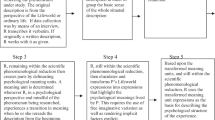Abstract
Trenton Merricks has argued that given endurantism personal identity is unanalysable in terms of psychological continuity, while Anthony Brueckner has argued against this claim. This article shows that neither philosopher has made a compelling case and also shows what it would take to settle the issue either way. It is then argued that whether personal identity is analysable or not may not be of crucial importance to those wanting to defend a psychological continuity approach to personal identity.
Similar content being viewed by others
Notes
A “non-branching” clause is likely to be added to the right-hand side of the biconditional, and I omit such a clause just for simplicity. Nothing turns on the omission in what follows.
Merricks does assert that his unanalysability thesis removes the ‘motivation’ for thinking psychological continuity is a criterion of personal identity, and he refers to his (1998) for arguments against criteria of identity generally. Discussion of these arguments is beyond the scope of this paper but see Zimmerman (1998) for criticism.
See Grice (1975).
One could query (1) on the grounds that there is a difference between a relation itself and a relation in extension. For instance, one might think of a relation as an abstract universal and a relation in extension as a set of ordered n-tuples. =p was stipulated to be a relation in extension. So one could argue that (1) should only be accepted if by ‘personal identity’ we really mean personal identity in extension. Similar worries would apply to (2) and (3). I set this worry aside, however, to focus on a more important worry that follows.
Here I have in mind arguments like Eric Olson’s (2007: 29-30) ‘thinking animal’ problem, which is meant to show that the best overall metaphysical position would be one according to which human persons are identical with human organisms.
References
Brueckner, A. (2009). Endurantism and the psychological approach to personal identity. Theoria, 75, 28–33.
Grice, P. (1975). Personal identity. In J. Perry (Ed.), Personal identity (pp. 73–95). Berkeley: University of California Press.
Merricks, T. (1998). There are no criteria of identity over time. Noûs, 32, 106–124.
Merricks, T. (1999). Endurance, psychological continuity, and the importance of personal identity. Philosophy and Phenomenological Research, 59, 983–997.
Olson, E. (2007). What are we? New York: OUP.
Zimmerman, D. (1998). Criteria of identity and the ‘identity mystics’. Erkenntnis, 48, 281–301.
Acknowledgments
Thanks to Murali Ramachandran. Thanks also to anonymous referees for some excellent comments.
Author information
Authors and Affiliations
Corresponding author
Rights and permissions
About this article
Cite this article
Langford, S. Is Personal Identity Analysable?. Acta Anal 29, 309–316 (2014). https://doi.org/10.1007/s12136-013-0211-7
Received:
Accepted:
Published:
Issue Date:
DOI: https://doi.org/10.1007/s12136-013-0211-7




